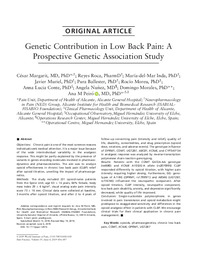Título :
Genetic Contribution in Low Back Pain: A Prospective Genetic Association Study |
Autor :
Margarit, César
Roca, Reyes
Inda, María del Mar
Muriel, Javier 
Ballester, Pura 
Moreu, Rocio
CONTE, LUCIA 
Nuñez, Ángela
Morales, Domingo 
Peiró, Ana  |
Editor :
Wiley Online Library |
Departamento:
Departamentos de la UMH::Farmacología, Pediatría y Química Orgánica |
Fecha de publicación:
2019-11 |
URI :
https://hdl.handle.net/11000/32338 |
Resumen :
Objectives: Chronic pain is one of the most common reasons individuals seek medical attention. It is a major issue because of the wide interindividual variability in the analgesic response. This might be partly explained by the presence of variants in genes encoding molecules involved in pharmacodynamics and pharmacokinetics. The aim was to analyze opioid effectiveness in chronic low back pain (CLBP) relief after opioid titration, unveiling the impact of pharmacogenetics.
Methods: The study included 231 opioid-naïve patients from the Spine Unit; age 63 ± 14 years, 64% female, body mass index 29 ± 6 kg/m2 , visual analog scale pain intensity score 73 ± 16 mm. Clinical data were collected at baseline, 3 months after opioid titration, and after 2 to 4 years of follow-up concerning pain (intensity and relief), quality of life, disability, comorbidities, and drug prescription (opioid dose, rotations, and adverse events). The genotype influence of OPRM1, COMT, UGT2B7, ABCB1, KCNJ6, and CYP3A5*3A in analgesic response was analyzed by reverse-transcription polymerase chain reaction genotyping.
Results: Patients with the COMT G472A-AA genotype (rs4680) and KCNJ6 A1032G-A allele (rs2070995) CLBP responded differently to opioid titration, with higher pain intensity requiring higher dosing. Furthermore, GG- genotypes of A118G (OPRM1, rs1799971) and A854G (UGT2B7, rs776746) influenced the neuropathic component. After opioid titration, CLBP intensity, neuropathic component, low back pain disability, anxiety, and depression significantly decreased, while quality of life improved.
Conclusion: Single-nucleotide polymorphisms in genes involved in pain transmission and opioid metabolism might predispose to exaggerated sensitivity and differences in the opioid analgesic effect in patients with CLBP. We encourage clinical trials for their clinical application in chronic pain management.
|
Palabras clave/Materias:
COMT
KCNJ6
OPRM1
UGT2B7
chronic low back pain
opioids
pharmacogenetics |
Área de conocimiento :
CDU: Ciencias aplicadas: Medicina: Farmacología. Terapéutica. Toxicología. Radiología |
Tipo de documento :
info:eu-repo/semantics/article |
Derechos de acceso:
info:eu-repo/semantics/openAccess |
DOI :
https://doi.org/10.1111/papr.12816 |
Publicado en:
Pain Practice: the official journal of World Institute of Pain. 2019 Nov;19(8):836-847 |
Aparece en las colecciones:
Artículos - Farmacología, Pediatría y Química Orgánica
|
 La licencia se describe como: Atribución-NonComercial-NoDerivada 4.0 Internacional.
La licencia se describe como: Atribución-NonComercial-NoDerivada 4.0 Internacional.
.png)
